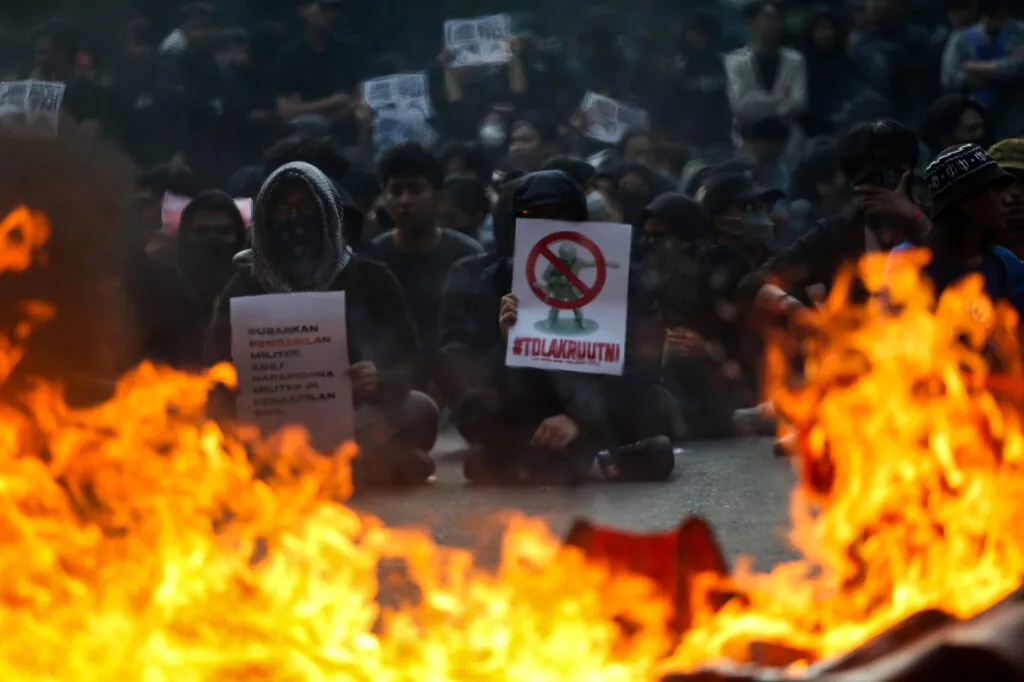
(Photo: East Asia Forum).
Barely months into his presidency, Prabowo Subianto has swiftly consolidated power in Indonesia. His oversized cabinet, filled with loyalists, a muted opposition, and expansive welfare programs, highlights his preference for centralized governance. While these moves project strength, they risk straining Indonesia’s fiscal health, testing the patience of a fragile party coalition, and alienating Indonesia’s digitally savvy youth voters.
As Prabowo eyes re-election in 2029, his greatest challenge may not be defeating rivals but managing the contradictions of his own strategy.
In 2029, Prabowo will be 77 years old, which would make him Indonesia’s oldest elected president. This amplifies the stakes of his governance. Every decision he makes during this presidential term will shape whether he is remembered as the leader who solidified Indonesia’s resilience and growth or one whose rule crumbled under its own contradictions.
Prabowo owes his presidency largely to his predecessor, Joko ‘Jokowi’ Widodo. Exit polls revealed that over 40 per cent of Prabowo’s voters backed him primarily to continue Jokowi’s policy agenda.
Yet this reliance on borrowed political capital is a double-edged sword. To keep these decisive voters, Prabowo must uphold Jokowi’s socio-economic pragmatism, including prudent fiscal management, while maintaining household purchasing power. But his early choices suggest otherwise. His expanding the appointment of military officers to civilian roles in the government and increasing military involvement in social programs — alongside passing a revision to military laws to facilitate these moves — indicate a turn towards securitized governance. If Prabowo drifts too far from Jokowi’s technocratic-populist model, he risks losing key voters who backed him as a continuity candidate rather than a return to New Order-style authoritarianism.
The president’s position is complicated by Vice President Gibran Rakabuming Raka, Jokowi’s son. Gibran’s presence ensures access to his father’s voter base but fuels accusations of dynastic politics. Surveys show a significant proportion of millennials and Gen Z express concern over nepotism and elite entrenchment. Should Prabowo position Gibran as his successor, he risks backlash from reformers. But should Gibran be sidelined, Prabowo may fracture his coalition, which includes Jokowi’s vast constituency in key electoral communities.
Prabowo’s flagship Free Nutritious Meal program aims to feed 82 million children and pregnant women. With costs estimated at 10 per cent of the annual national budget, its feasibility is questionable. Rather than implementing the program in phases, Prabowo instituted cuts across the government to fund full coverage by the end of 2025. This establishes ‘for the people’s credentials but risks destabilizing institutions and economic sectors — not to mention coalition partners whose patronage networks are compromised.
The government’s gamble is that expanded welfare will offset public frustration over job scarcity. Prospective Gen Z employees face persistent underemployment challenges — low wages, minimal protections, and scant skill development. Prabowo’s promise to create 19 million jobs by 2029 hinges on attracting high-value investments. Yet his decision to retain Jokowi’s ban on raw mineral exports has yet to drive significant investments or job expansion in domestic critical minerals processing.
Prabowo has an inherent generational distance from his core constituency. By 2029, millennials and Gen Z would comprise two-thirds of Indonesia’s electorate. Unlike older voters who experienced the chaotic post-Suharto reformasi years, these digital natives prioritize economic mobility, digital freedom, and transparent governance. Surveys by Populix and IDN Research Institute reveal that these groups consistently demand stronger anti-corruption measures, improved job opportunities, and unrestricted internet access.
Prabowo appears to be heading in the opposite direction. Deliberations to revise the Broadcasting Law would expand the government’s power to block ‘disruptive’ online content. Under the guise of cybersecurity, the government — with deep military involvement — appears poised to tighten control over online discourse. Such moves risk provoking a backlash akin to Thailand’s 2020 youth protests. With 73 per cent of Indonesians active on social media and the third-highest TikTok usage globally, Prabowo’s team cannot afford to lose this support base.
Prabowo’s sprawling ‘Big Tent’ coalition may struggle to maintain cohesion. The cast of diverse actors — nationalist technocrats, Islamic conservatives, and regional power brokers — has bred ideological tensions. Islamic parties may push for greater moral regulation, alienating secular elites and business interests. Growing unease among civilian allies over the military’s expanding footprint in government could fracture elite consensus.
The Trump administration’s imposition of a 32 per cent tariff on Indonesian exports to the United States — dominated by rubber, electronics, and low-end manufacturing — has exacerbated economic fragility. The Jakarta Composite Index has faltered amid capital flight and investor uncertainty, while fiscal pressures mount from an overstretched welfare agenda. As global supply chains rewire towards US-aligned economies, Indonesia faces revenue shocks and rising costs.
Beyond direct trade impacts, Indonesia will also be affected by the intensifying US-China rivalry. The US strategic trajectory with massive tariffs signals a hardening posture that risks deepening strategic polarization. As China responds with regional overtures, Southeast Asia could become a contested frontier. For Indonesia, navigating this rivalry without provoking disruption may prove as consequential as managing its domestic economic agenda.
History shows that leaders who centralize power often mistake compliance for loyalty. Prabowo’s model — military-backed welfare populism — may keep him popular until the first major crisis. The 1998 Asian Financial Crisis, which toppled his father-in-law, began with similar assurances of stability.
In the early months of his presidential term, Prabowo appears to hold the advantage. The public has praised him, and the opposition remains ineffective. But the path to the next election looks fraught. If he wants his presidency to be remembered not just for power but for progress, he must address the demands of Indonesia’s youth, build economic resilience and growth, resist autocratic shortcuts, and navigate treacherous geopolitical dynamics.*
Adi Abidin is a public policy specialist at Kiroyan Partners and a research fellow at Populi Center. The opinions expressed in this article are his own.
Source: East Asia Forum, June 10, 2025.
Download the clipping here.



